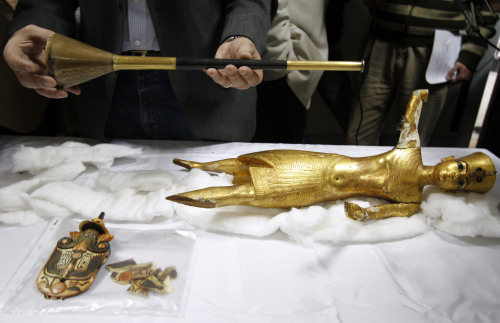CAIRO (AP) ― Taking advantage of Egypt’s political upheaval, thieves have gone on a treasure hunt with a spree of illegal digging, preying on the country’s ancient pharaonic heritage.
Illegal digs near ancient temples and in isolated desert sites have swelled a staggering 100-fold over the past 16 months since a popular uprising toppled Hosni Mubarak’s 29-year regime and security fell apart in many areas as police simply stopped doing their jobs. The pillaging comes on top of a wave of break-ins last year at archaeological storehouses ― and even at Cairo’s famed Egyptian Museum, the country’s biggest repository of pharaonic artifacts.
Horrified archaeologists and antiquities authorities are scrambling to prevent smuggling, keeping a watch on European and American auction houses in case stolen artifacts show up there.
“Criminals became so bold they are digging in landmark areas,’’ including near the Great Pyramids in Giza, other nearby pyramids and the grand temples of the southern city of Luxor, said Maj. Gen. Abdel-Rahim Hassan, commander of the Tourism and Antiquities Police Department.
Illegal digs near ancient temples and in isolated desert sites have swelled a staggering 100-fold over the past 16 months since a popular uprising toppled Hosni Mubarak’s 29-year regime and security fell apart in many areas as police simply stopped doing their jobs. The pillaging comes on top of a wave of break-ins last year at archaeological storehouses ― and even at Cairo’s famed Egyptian Museum, the country’s biggest repository of pharaonic artifacts.
Horrified archaeologists and antiquities authorities are scrambling to prevent smuggling, keeping a watch on European and American auction houses in case stolen artifacts show up there.
“Criminals became so bold they are digging in landmark areas,’’ including near the Great Pyramids in Giza, other nearby pyramids and the grand temples of the southern city of Luxor, said Maj. Gen. Abdel-Rahim Hassan, commander of the Tourism and Antiquities Police Department.

“It is no longer a crime motivated by poverty. It’s naked greed and it involves educated people,’’ he said.
In a country with more than 5,000 years of civilization buried under its sands, illegal digs have long been a problem. With only slight exaggeration, Egyptians like to joke you can dig anywhere and turn up something ancient, even if its just pottery shards or a statuette.
But in the security void, the treasure hunting has mushroomed, with 5,697 cases of illegal digs since the start of the anti-Mubarak uprising in early 2011―100 times more than the previous year, according to figures obtained by The Associated Press from the Interior Ministry, which is in charge of police.
Related crimes have risen as well ― 1,467 cases of illicit trading in antiquities and 130 attempts to smuggle antiquities abroad. At least 35 people have been killed in incidents connected to illegal digs, including 10 buried alive in the southern city of Naga Hamadi in March when the hole they dug in the ground caved in. Others were killed in disputes when thieves fell out over sharing the finds, according to Interior Ministry officials familiar with the incidents. They spoke on condition of anonymity because they were not authorized to talk to the press.
Those are just the crimes that police uncovered.
In their digs, fortune hunters pick spots that are just outside major archaeological sites in hopes that treasures can be found some distance beyond their parameters. Others dig in areas set aside for future excavations by the Supreme Council of Antiquities, Egypt’s top state archaeological agency.
Last month, police arrested two men who lived just behind the temple of Khnum in the southern town of Esna for illegally digging under their homes. Police said they found a 10-meter deep hole under the houses with hieroglyphic inscriptions dating to the Ptolemaic dynasty as well as ancient clay pots.
Farther south in the Nile-side city of Aswan, police last month arrested a government employee who also dug under his house, uncovering clay pots, an incense urn and tablets bearing images of lotus flowers.
The ministry officials said the surge reflects in part the failure of the police to fully take charge of security after they melted away on Jan. 28 last year, after deadly clashes with protesters on the fourth day of the 18-day anti-Mubarak uprising. Since then, many police have been balking at investigating crimes and pursuing criminals, whether out of resentment over the “revolution’’ or because of the continued lack of strong political authority.
The night of Jan. 28, thieves broke into the Egyptian Museum, located on the edge of Tahrir Square, the epicenter of the anti-regime uprising and scene of some of the bloodiest clashes between protesters and Mubarak’s hated police. The robbers made off with 51 pieces that were on display ― of which 29 have since been recovered. The most valuable stolen piece, a statue of the Pharaoh Akhenaten, was found by a 16-year-old protester and his family returned it to the museum, the antiquities ministry said at the time.
Soon after Mubarak’s Feb, 11, 2011 ouster, the officials said, a Jordanian man was caught trying to smuggle as many as 3,753 artifacts out of Egypt. These, they said, included 48 ancient Egyptian statutes, Roman Age coins and 45 pieces of jewelry dating from the Medieval years of the Islamic era.
-
Articles by Korea Herald







![[Graphic News] More Koreans say they plan long-distance trips this year](http://res.heraldm.com/phpwas/restmb_idxmake.php?idx=644&simg=/content/image/2024/04/17/20240417050828_0.gif&u=)
![[KH Explains] Hyundai's full hybrid edge to pay off amid slow transition to pure EVs](http://res.heraldm.com/phpwas/restmb_idxmake.php?idx=644&simg=/content/image/2024/04/18/20240418050645_0.jpg&u=20240419100350)






![[From the Scene] Monks, Buddhists hail return of remains of Buddhas](http://res.heraldm.com/phpwas/restmb_idxmake.php?idx=652&simg=/content/image/2024/04/19/20240419050617_0.jpg&u=20240419175937)

![[KH Explains] Hyundai's full hybrid edge to pay off amid slow transition to pure EVs](http://res.heraldm.com/phpwas/restmb_idxmake.php?idx=652&simg=/content/image/2024/04/18/20240418050645_0.jpg&u=20240419100350)

![[Today’s K-pop] Illit drops debut single remix](http://res.heraldm.com/phpwas/restmb_idxmake.php?idx=642&simg=/content/image/2024/04/19/20240419050612_0.jpg&u=)